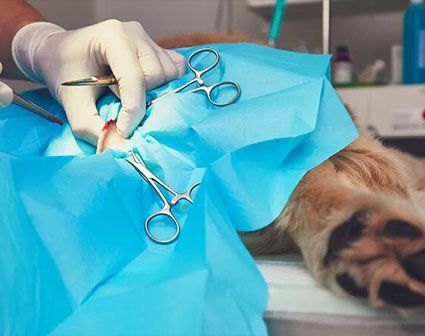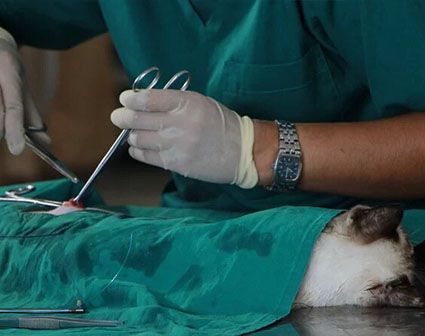Pet Care And Surgery
For all pet parents, it can be worrysome to know that their lovely pets need surgery. If our veterinarians recommend a surgical procedure to treat any medical issue affecting your pet’s health, rest assured that it’s with the best interest of the pet in mind. At DCC Animal Hospital, our veterinarians provide you with every detail about the issue, diagnosis procedure, recovery time, and overall cost of the surgery. From spaying and neutering services to more complex veterinary surgical procedures, DCC Animal Hospital is well equipped to handle all medical needs of your beloved pet. We follow global veterinary standards to keep your pet in the best health. We plan, propose, and perform a preoperative examination according to your pet’s condition at our centres.
Depending on the nature of the surgery, pre‐surgical abnormalities can be addressed, and drug selections can be modified. Sometimes surgery is postponed or even cancelled until the surgical team feels that it is the only option left. Once anaesthesia is deemed safe for the patient, we use specialized monitoring equipment to track vital signs and pay close attention to ensure the best possible outcome for your pet. We strive to provide the highest quality of surgical care and achieve the highest level of client satisfaction. Our approach to veterinary care allows us to provide the best possible treatment options for your pet. Connect with our expert veterinary surgeons today.
For all pet parents, it can be worrysome to know that their lovely pets need surgery. If our veterinarians recommend a surgical procedure to treat any medical issue affecting your pet’s health, rest assured that it’s with the best interest of the pet in mind. At DCC Animal Hospital, our veterinarians provide you with every detail about the issue, diagnosis procedure, recovery time, and overall cost of the surgery. From spaying and neutering services to more complex veterinary surgical procedures, DCC Animal Hospital is well equipped to handle all medical needs of your beloved pet. We follow global veterinary standards to keep your pet in the best health. We plan, propose, and perform a preoperative examination according to your pet’s condition at our centres.
Depending on the nature of the surgery, pre‐surgical abnormalities can be addressed, and drug selections can be modified. Sometimes surgery is postponed or even cancelled until the surgical team feels that it is the only option left. Once anaesthesia is deemed safe for the patient, we use specialized monitoring equipment to track vital signs and pay close attention to ensure the best possible outcome for your pet. We strive to provide the highest quality of surgical care and achieve the highest level of client satisfaction. Our approach to veterinary care allows us to provide the best possible treatment options for your pet. Connect with our expert veterinary surgeons today.
Below are some of the common procedures we perform under our vet services for cats, dogs and other pets:
Spray/Castration Pyometra Various types of tumour removal Reconstruction surgery Aural hematoma surgical repair Cherry eye surgical repair Gastrotomy/ Enterotomy GDV reduction & gastropexy Splenectomy Cystotomy Various types of hernia repair Limb amputation Various types of fracture repair
Post Surgery Care
Once the surgery is over, your pet will be moved to a dry, warm place where they can recover from the effect of anaesthesia. For the next 12-24 hours after surgery, your pet will most likely be weary, so give them plenty of rest. We will keep you informed about the post-surgery tips for your beloved pet. Moreover, here are some key pointers for you to understand the post-operative phase.
The amount of exercise you must restrict depends on the type of procedure the vet chooses for your pet. Always use bedding or blankets to make them comfy. Try to spend more time with them to keep them relaxed. Also, make sure they get the right medication at the right time as prescribed by the vet. Follow your veterinarian’s recovery plan for your pet until he/she tells you to change or discontinue it. Want To Schedule Veterinary Surgery for Your PET?
If you want to discuss surgical options or schedule surgery for your pet, feel free to contact us today. Our vet surgeons are highly experienced and will help you with all that’s needed in terms of information, procedure, pre and post-surgery. Be rest assured!
Multiple problems, one consult.
Ask our doctors anything about
Pet Health
Concerned about your pet’s overall health? We have you covered
Pet Vaccinations
Need expert advice regarding your pets vaccinations? Our doctors will solve all your queries
Pet Behaviour
Worried about your pet’s unusual behaviour? Consult our doctors to get to the root of the problem
Second Opinion
Are you feeling doubtful over an ongoing pet treatment?










 How can we help?
How can we help?